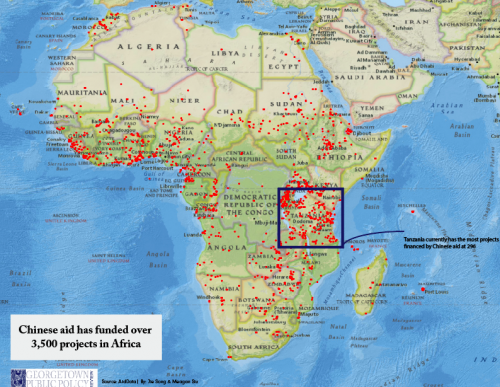Following the promotion of the “One Belt, One Road” initiative, China’s aid has attracted greater attention. According to the first white paper on Chinese foreign aid, the country directed 51.8% of its assistance to Africa from 2000 to 2012; vast reserves of natural resources, low commodity prices, and preferential policies for foreign direct investment make Africa an attractive region for China. But while these recent inflows bring huge benefits, they also raise many concerns.
Changes in China’s aid policies
China’s interest in African development formed when the Communist party came to power in the mid-20th century. Before the “Reform and Opening-Up” policy of 1978, Chinese aid to Africa resembled “Official Development Assistance,” an OECD aid classification that indicates aid provided by official actors to help economic development and social welfare. This is the form of aid generally associated with international development. China’s intention was to maintain “friendship” and promote its ideology. Despite being one of the poorest countries at the time, China gave Africa millions of interest-free loan and grants, sent thousands of aid workers, and even built the TAZARA Railway, connecting landlocked Zambia with the port of Dar-es-Salaam in Tanzania. The investments paid off: African countries supported the Government of the People’s Republic of China in international organizations, which ultimately “restored” its seat in the United Nations and the Security Council in 1971 while expelling the representatives from the Republic of China (Taiwan).
Since the 1978 reform period however, the Chinese agenda has become more pragmatic. Unlike the pre-reform period, construction projects and service exports to Africa place a greater emphasis on profit, in which State-Owned Enterprises (SOEs) and private businesses compete for contracts. These changes are branded as the “Belt and Road Initiative,” which many regard as a Chinese attempt to relieve the production constraints of its industrial sectors at home.
Beijing’s new agenda also focuses on satisfying its growing hunger for energy. This differs from traditional aid in its concern for natural resources and a “no-political-strings-attached” feature. That is, China requires recipients to provide commodity exports to repay development loans, but avoids other political conditions typically imposed by large international donors like the World Bank. Even in countries with horrible human rights record, like Angola, the Democratic Republic of Congo and Sudan, Chinese’ pragmatism prevails. For this reason, Chinese aid is welcomed by African countries but criticized by traditional donors. Furthermore, the tendering procedures of Chinese projects are not transparent, so Chinese SOEs usually win bids. This process has been branded “neo-colonialism” because of its focus on natural resources, and many suspect it exacerbates government oppression in unstable African countries.

Consequences of aid:
These aid practices have global repercussions. On the positive side, there is a growing literature on the beneficial changes brought by Chinese aid. A working paper from the African Development Bank argues that Chinese aid targets poverty reduction and provides significant technical assistance in health and agriculture sectors. Moreover, China focuses on sectors that are underfinanced by traditional donors, such as infrastructure. Economist Axel Dreher and colleagues find that Chinese aid has a positive impact on the economic growth of the recipient countries without weakening the effectiveness of aid from traditional donors. Politically, China’s no-strings-attached approach has helped to reduce the average number of foreign aid conditions globally, even from traditional donors; recipient countries have greater bargaining power in their negotiation with traditional donors because China offers an unconditioned alternative.
The consequences of China’s practices are not always good. Chinese aid projects in high-pollutant sectors like fossil fuel power stations raise environmental concerns; the media and environmental NGOs have harshly criticized Chinese investment for causing environmental degradation. Some also suspect that Chinese unconditional aid makes recipient governments more violent to its citizens and increases the risk of civil conflict . This is because Chinese aid is arguably more fungible than assistance from traditional donors, which means that money earmarked for a particular use can easily be diverted to satisfy the domestic political goals of corrupt regimes. However, these criticism remain speculative. There is weak systematic and cross-national evidence on the negative environmental impact of Chinese aid in Africa; similarly, the assumption of higher fungibility and the causal mechanisms in the aid-conflict nexus are still debated.
Conclusion:
In China’s long relationship with Africa, its aid policies have become more pragmatic – or “mutually beneficial,” as Chinese officials like to say. A focus on natural resources and unconditionality make Chinese aid distinctive but highly controversial. Quantitative and anecdotal evidence tell different stories, implying the impact is multi-faceted and complicated. Undeniably, China has become an important player in the donor community, but whether they do more good or harm is unresolved.
Jie Song is a Master of Public Policy candidate at McCourt. She is from China. Her primary research interest is international development, particularly the development work in sub-Saharan Africa. Last summer, she worked in Tanzania for Georgetown University Initiative on Innovation, Development and Evaluation (gui2de). Prior to McCourt, she completed a major in economics with First Class Honors from the Chinese University of Hong Kong.
2 thoughts on “The Dragon’s Gift or Poison? Chinese Aid to Africa”
Comments are closed.